
5 Halloween Audiobooks to Listen to While You Hide From Children
Feel the Fear, from The Omen to Jenny Slate
“Halloween is a holiday of fear, of manufactured scares that quicken the heart,” writes Hillary Monahan in His Hideous Heart, a new collection of Poe-inspired short stories. This makes Halloween the perfect season for audiobooks. Whether your scary book preferences lean toward ghosts, zombies, vampires, or chainsaw-wielding madmen, nothing enhances the terror like the voice of a total stranger delivering those scares inside your ears.
Another frightful advantage of audiobooks? Reading with the lights off. A darkened house, I can attest, is also useful when you’ve forgotten to buy candy for trick-or-treaters. So turn off the lights, turn up the volume, and pretend you’re not home with this month’s audiobook recommendations. The chills, as they say, are coming from inside your ears.
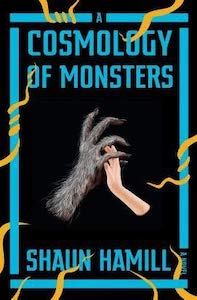
A Cosmology of Monsters by Shaun Hamill
Narrated by Sean Patrick Hopkins · Pantheon/Random House Audio
10 hours and 47 minutes
“I think horror is the most important fiction in the world,” says the eccentric patriarch of Shaun Hamill’s absorbing funhouse of a debut novel. Indeed, the horror genre is what brings Harry Turner closer to his future bride, Margaret. She calls the H.P. Lovecraft he lends her “self-important, unreadable junk,” but leaving a haunted house after their second date, she imagines “a small, anxious wedding, life in a blue-collar neighborhood, aggressive penny-pinching, hand-me-down clothes, thrift store shopping. She felt powerless and unwilling to stop it from becoming a reality.”
What Margaret cannot foresee is single motherhood after Harry dies of cancer, nor the children who go missing from their neighborhood, nor the creatures that hover around the family, intermittently visible, “long and skull-like faces, protruding snouts, and eyes the bright orange of traffic cones.” The couple’s son, Noah, who narrates the novel, has more sustained and far stranger encounters with one of the creatures, and Hamill has more on his mind than basic scares.
Sound effects in audiobooks rarely transcend distraction. Ocean sounds in a Michael Connelly novel reminded me of an old radio play, and background music in Carly Simon’s memoir, Boys in the Trees, caused me to stop reading a few minutes in. The subtle, judicious noises in A Cosmology of Monsters represent progress for those who crave an enhanced reading experience. The creaking, thudding, or tinkling piano rarely compete with the narration. My ears required minimal adjustment to the sonic textures, and the overall effect is no more distracting than a novel in print with accompanying illustrations.
A story of a family altered by grief, A Cosmology of Monsters is also a coming-of-age quest told by the credulous Noah. Audiobook narrator Sean Patrick Hopkins makes a fine surrogate for the main character. Take away the literal bells and whistles, and this could be the audiobook of literary fiction. The same might be said of the novel itself. Hamill’s characters are as richly imagined and emotionally nuanced as those found in narratives without monsters.
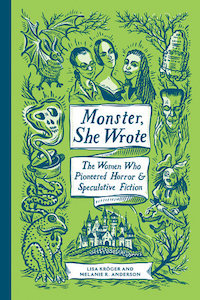
Monster, She Wrote: The Women Who Pioneered Horror and Speculative Fiction by Lisa Kröger and Melanie R. Anderson
Narrated by Erin Bennett · Quirk Books/Blackstone Audio
7 hours and 29 minutes
“Women are accused of being transgressive all the time,” write Lisa Kröger and Melanie R. Anderson, “or at least they are used to stepping outside of the carefully drawn boundaries that society has set for them.” It should come as no surprise, therefore, that for centuries women have played an influential role in shaping the transgressive genres of horror and speculative fiction. In Monster, She Wrote, Kröger and Anderson track that influence, placing dozens of unheralded writers in historical and literary context.
Mary Shelley, Edith Wharton, Shirley Jackson, and V.C. Andrews might be household names, but most writers in this book will be unknown to readers not steeped in the horror genre. Beginning with 18th-century Gothic novels and 19th-century ghost stories, the authors offer short, engaging biographies and smart, casual analysis. They also draw a convincing line between the 1600s and contemporary innovators like Karen Russell, Helen Oyeyemi, and Carmen Maria Machado.
One of the more fascinating chapters in a book that fascinates on every page centers on the pulp writers of the mid-20th century, most of whom “lived a dual existence. By day, they worked in an office, typing memos for the boss, and then rushing home to kiss their husbands as they [came] through the door. By night, they sat at their own typewriters, releasing their worlds of imagination onto paper.” Time has complicated the biographies of these women even further as their work, much of it printed on the cheap, degradable paper from which the pulp genre took its name, is increasingly difficult to find.
Speaking of underappreciated women, the audiobook’s narrator, Erin Bennett, reads with a seamless, effortless intelligence that is far more difficult than it sounds. On the surface, Bennett reads in the straightforward manner preferred by most audiobook readers of nonfiction. It calls no attention to itself, but her reading captures both the wit of the authors’ prose and the depth of their analysis. She also shifts nimbly between narrative, scholarship, and brief excerpts from the fiction discussed.
Part annotated bibliography, each section of Monster, She Wrote concludes with multiple reading recommendations. Those curious about the work described will also appreciate detailed information about how and where to find it.
The authors retell a well-known anecdote in which a nurse asked Shirley Jackson her occupation when checking her into the hospital for the birth of her third child. “Jackson replied that she was a writer, to which the nurse said, ‘I’ll just put down housewife.’” In 2019, Shirley Jackson’s work and reputation need little elevation, but Monster, She Wrote continues, and in some cases begins, that vital work for dozens of other women.
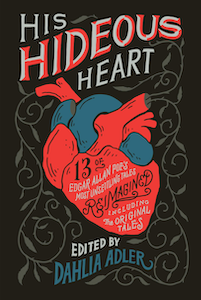
His Hideous Heart: 13 of Edgar Allan Poe’s Most Unsettling Tales Reimagined, edited by Dahlia Adler
Narrated by Amanda Lovelace, Caitlin Davis, Caleb Roehrig, and others · Flatiron Books/Macmillan Audio
14 hours and 13 minutes
For many, Halloween means fun with kids, and a new collection of Poe-inspired short stories will entertain readers of most age groups. Edited by young adult author Dahlia Adler, His Hideous Heart offers 13 contemporary, previously unpublished takes on Edgar Allan Poe by a diverse lineup of YA authors. Older readers, and hopefully younger ones, too, will appreciate the inclusion of the original Poe stories that launched their YA counterparts.
In Lamar Giles’s “The Oval Filter,” inspired by Poe’s “The Oval Portrait,” a high school football player receives social media notifications from his deceased girlfriend. He thinks at first they’re from a tribute page, but “all the pictures were framed by the oval filter, various angles of her face in the typical IG grid, but arranged so that if you looked at them quickly, your eye bouncing from one to the next, she appeared to thrash about like an infant shaken by a grown man with such force, thick swaths of her hair fanned into tentacles reaching beyond the oval frame.” Like many ghosts, she is reaching out with clues about her murder.
In Fran Wilde’s “The Fall of the Bank of Usher,” a brother-sister team of hackers gains access to an offshore bank. Dahlia Adler’s take on Poe’s “Ligeia” is another story of lost love. In this one, the lesbian narrator whose girlfriend has died tries to move on with a girl who has just transferred to their high school. If we didn’t already know the new romance won’t end well, the audiobook’s narrator telegraphs our expectations with a calm foreboding.
The cast of narrators for the audiobook is large, a different reader for each story, which makes more sense when you reach the Poe originals. These are narrated by the same reader as the contemporary stories they’ve inspired, revealing additional similarities one might miss in print. It’s hard to believe readers of the young adult stories won’t come away Poe fans. Adults skeptical of the young adult genre will also find much to admire.
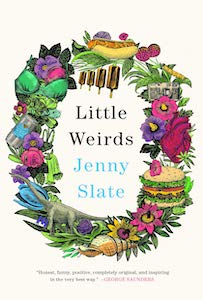
Little Weirds by Jenny Slate
Narrated by Jenny Slate · Little, Brown/Hachette Audio
4 hours and 19 minutes
If you’re looking for ghosts and a haunted house, Jenny Slate offers both in Little Weirds, a collection of not quite stories and not quite essays that are somehow more than both. The first book from the actress and comedian, Little Weirds could be called an unconventional memoir, though she’s less interested in the chronology of her life than making sense of complicated emotions. Holding the book together is Slate’s intelligence and eye for the absurd, which is to say her voice, and the audiobook read by the author is pure joy for her subtlety, sensitivity, and comic timing.
Some of Slate’s pieces are daydreams or imagined scenarios. In one, the narrator, whom we presume is a version of the author, is harassed at a party by a man “talking about how he knew that ‘now was the time for men to listen.’ And he was so proud to say that he knew how to listen. But strangely he kept talking for so long, and I was the one who was listening.” When the narrator’s head twists around, he continues talking. Then her head pops off and rolls under a table. Hilarity ensues, along with cultural insights.
Few books explore self-doubt and loneliness with as much fun or creativity. A series of imagined deaths throughout the book comment on Slate’s anxieties. “I woke up and it was Valentine’s Day,” she writes in one of these, “and I was lying in my bed, and my body was the shape of a melting chair. I was actually just a melting chair with nobody left to sit in it. I was a useless, ruined form yelling, ‘Sit on me! Please put your weight on me!’ in a worthless, pointless voice that sounded like a fart under the covers.”
If you’re unfamiliar with Jenny Slate’s acting or comedy, the timbre of her voice is soft and magnetic. She might remind you of Jane Wiedlin of the Go-Go’s or the actress Leslie Mann. More than her voice itself, her narration of the audiobook reveals a performer keenly aware of language and narrative. Some entertainers read their audiobooks as though they are still onstage, and while Little Weirds will entertain you, it is very much a book and Jenny Slate very much a writer.
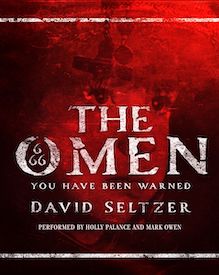
The Omen by David Seltzer
Narrated by Holly Palance · Signet/Dreamscape Media
7 hours and 8 minutes
This Halloween is the first in which you can read the classic horror novel The Omen as an audiobook. Published weeks before the 1976 movie starring Gregory Peck and Lee Remick, David Seltzer’s novel about the pint-sized antichrist named Damien has previously only been available in audio to patrons of the National Library Service for the Blind. Narrator Holly Palance employs an understated style to mine Seltzer’s material for the chills inherent in the story.
The Omen follows Jeremy and Katherine Thorn, an American politician and his wife living abroad, whose child-bearing difficulties ensnare them in a plot to groom Satan’s child for world domination. The literary term for these machinations, I believe, is religious mumbo jumbo. Like Rosemary’s Baby, Ira Levin’s child-of-Satan novel to which Seltzer’s is often compared, The Omen’s prose is frequently sharp and its plotting tight.
“[Damien] was growing into the artist’s rendering of the ideal child,” Seltzer writes. “He had a kind of composure, a contentment that one rarely sees in the young.” The same could be said of Holly Palance’s narration, which feels thoughtful and restrained for a horror novel featuring gruesome, unexplained deaths. Her composure makes the story’s outlandish elements a little more credible, and she negotiates Italian, British, and Middle Eastern accents with ease. Readers might be slightly disappointed, however, to find nothing spooky about Palance’s voice.
The Omen’s most frightening scenes don’t involve Damien but his elderly caretaker and an ominous black dog. Brace yourself for a graveyard showdown with this dog and its brethren. The book’s scares have held up well in the four decades since it was published, especially the religious text that explains how Jeremy Thorn got mixed up in Satan’s plot. “The devil’s child,” it reveals, “will rise from the world of politics.”
James Tate Hill
James Tate Hill is the author of a memoir, Blind Man’s Bluff (W. W. Norton, 2021). His fiction debut, Academy Gothic, won the Nilsen Literary Prize for a First Novel. He serves as fiction editor for Monkeybicycle and a contributing editor for Lit Hub, where he writes a monthly audiobooks column.



















